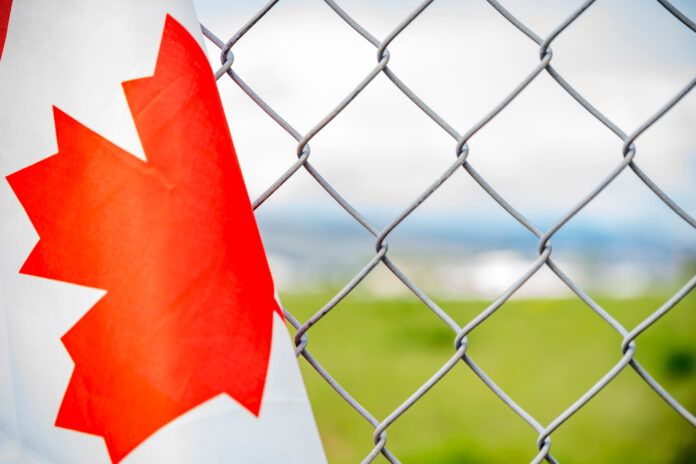
Quebec and New Brunswick will no longer keep immigration detainees in provincial jails after cancelling their contracts with the Canada Border Services Agency (CBSA).
That brings the total of provinces who have decided to cancel these contracts with the CBSA to seven, including British Columbia, Alberta, Saskatchewan, Manitoba and Nova Scotia.
Quebec will stop imprisoning immigration detainees in its provincial jails by the end of this year. New Brunswick will put an end to the practice by Feb. 28 next year.
Migrant rights and civil liberties activists are thrilled by the move.
“We thank Quebec and New Brunswick for championing Canada’s growing consensus on immigration detention in provincial jails,” said Ketty Nivyabandi, secretary general of Amnesty International Canada’s English-speaking section.
Read More Canada Immigration News
Manitoba To No Longer Hold Immigration Detainees In Provincial Jails
Alberta To Stop Holding Immigration Detainees In Provincial Jails After Ending CBSA Contract
Canada Immigration Detainees To Continue To Be Held In Provincial Jails In Five Provinces
“Now, seven provinces representing nearly two thirds of the Canadian population have declared they no longer wish to participate in the inhumane, discriminatory practice of jailing migrants and refugees.
“It’s time for the three remaining provinces, including Ontario, whose jails hold more people in immigration detention than any other province, and the federal government to finally side with history and justice.”
Ontario, which holds the greatest number of detainees in provincial jails, is reportedly reviewing its agreement with the CBSA.
Saskatchewan is ending its contract with the CBSA which will expire by September this year. Manitoba’s contract will end next year.
By then, immigration detention will have already ended in British Columbia, Nova Scotia, and Alberta.
Amnesty International Canada and Human Rights Watch both maintain there are human rights violations that take place within immigration detention and have called on the provinces and Ottawa to put a stop to immigration detention in provincial jails.
Watch Video
“The decisions taken by Quebec and New Brunswick represent an important step towards putting an end to a harmful and discriminatory system of immigration detention,” said France-Isabelle Langlois, executive director of Amnistie internationale Canada.
“It is unacceptable that people fleeing conflict, disaster or extreme poverty find themselves in prison, in some cases in maximum-security detention. The federal government should take this as a cue to abolish immigration detention and put human rights at the core of its immigration and refugee-protection systems.”
Advocates who have been calling on Ottawa to end the housing of Immigration and Refugee Protection Act (IRPA) detainees in provincial jails across Canada are seeing this as the long-awaited result of their lobbying.
CBSA Detained 1,445 Migrants In Second Quarter Of Last Year
The latest data from the CBSA shows there were 1,445 migrants detained in Canada during the three months that ended Sept. 30 last year, the most recent quarter for which data is available.
Ontario, Quebec and British Columbia are at that time the three provinces with the greatest numbers of migrants being detained.
Persons Detained Sorted By Province
| Province | First quarter | Second quarter |
| Alberta | 63 | 53 |
| British Columbia | 223 | 283 |
| Manitoba | 8 | 4 |
| New Brunswick | 7 | 3 |
| Newfoundland and Labrador | 2 | 0 |
| Northwest Territories | 0 | 0 |
| Nova Scotia | 1 | 1 |
| Ontario | 644 | 574 |
| Prince Edward Island | 0 | 0 |
| Quebec | 435 | 525 |
| Saskatchewan | 13 | 2 |
| Yukon | 0 | 0 |
Canada holds migrants for detention based on seven grounds:
- Examination. If an officer considers it necessary to get more information from a migrant to complete an examination, that person can be detained to allow the officer to do so. An examination can be as simple as a few questions but can also include an examination of the person’s personal belongings, more intensive questioning, or personal searches;
- Suspicion of serious criminality, criminality or organized criminality;
- Suspicion of inadmissibility on grounds of security;
- Suspicion of inadmissibility on grounds of human/international rights violation;
- Identity. If an officer is unable to verify an individual’s identity, that person may be detained;
- Danger to the public, or;
- Unlikely to appear. A person may be detained if an officer believes the person is unlikely to appear for examination, an admissibility hearing, removal from Canada or at a proceeding that could lead to the making of a removal order.

